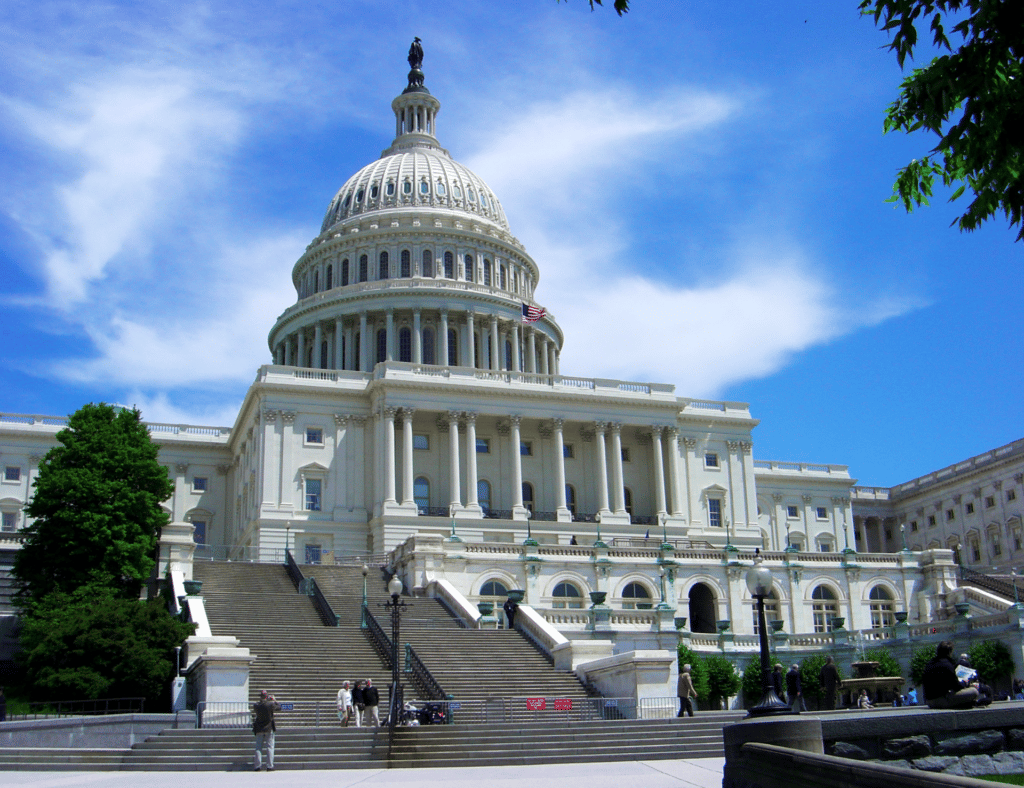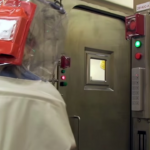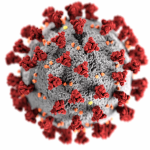If 167 hearings didn’t prepare Congress for the COVID pandemic, what will?
By Matt Field | July 27, 2022
 The US Capitol. Credit: Kevin McCoy. CC BY-SA 2.0.
The US Capitol. Credit: Kevin McCoy. CC BY-SA 2.0.
Like many people in early 2020, Ellen Carlin was fixated on the news coming out of China. But even though the Georgetown University infectious disease expert says she was “eating up” the early reports of COVID, she didn’t think the then-mysterious illness swirling around Wuhan would upend her life. Back then the threat felt far away.
“I wasn’t panicking. I wasn’t thinking that this was the big one,” she says. “This could have been the next SARS right? And SARS took up 700 lives, and it spread to a few countries, but it was contained. And I think based on the rhetoric I was hearing, that’s where this was going.”
She’s remembering just about right.
Nearly a month into the pandemic the situation in Wuhan had become so dire that China built a 1,000-bed hospital in just 10 days to handle coronavirus patients. Meanwhile, the US government was generally downplaying the threat. “Officials say most Americans not at risk of coronavirus” is how the infectious disease news outlet CIDRAP headlined a story following a late January news conference with Anthony Fauci and others.
But as the outbreak epicenter shifted from Wuhan to Italy to New York, the reality of the threat began to sink in. This actually was “the big one.” Health departments scrambled for tests. Governors fought on the open market for equipment for their hospitals. Officials reversed themselves on masking. And protests quickly sprouted up over public health measures. The switch to society-wide crisis seemed so sudden that former President Donald Trump’s defense of the government’s early failings might have seemed almost plausible at the time. “What a problem,” he said of COVID in March. “Came out of nowhere, but we’re taking care of it.”
Experts in and out of government had been saying pandemics were a major risk for years. They’d told lawmakers plenty of times that the US government needed to be better prepared. Carlin knew that. She had once been a staffer in the House of Representatives. Despite all the warnings, though, the government was caught flat footed by COVID. Carlin wanted to know: Just how much information on pandemic threats had Congress received? The answer, she would discover, was a lot.
In an analysis in the journal Health Security, Carlin and Ryan Remmel, a graduate student at Georgetown, found that Congress held at least 167 hearings on the threat of emerging infectious diseases between 1995 and the start of the COVID pandemic. These were hearings that often touched directly on the gaps in preparedness that COVID exposed. There were hearings on the availability of medical countermeasures for coronaviruses, on hospital readiness, on the disruption school closures would cause, and more. Carlin’s study paints a picture of a reactive Congress, one that would hold hearings when diseases like Ebola were in the news, but would retreat afterward. The study also highlights how uncoordinated Congress can be. Numerous committees that deal with pandemic-relevant areas—education, for instance—never even held a single hearing. The hearings pointed to areas where the government wasn’t doing enough, often by not properly funding efforts to mitigate the threat of emerging infectious diseases.
“I had been hearing the president and members of Congress say, ‘We just didn’t know,’ or ‘Somebody had to tell us that there were no masks in the stockpile,’ or ‘We couldn’t have predicted an outbreak of this magnitude,’” Carlin says. “I knew that that was wrong, and I wanted to put some numbers on it.”
Oversight, after the fact. Few Americans seem to like the job Congress is doing. The institution has a reputation for gridlock, and legislators frequently fail to move sweeping bills to address societal problems like climate change. But getting bills across the finish line is just one measure of congressional activity. Another is oversight. “Legislation,” Carlin says, “is one way you can turn ideas into action. It's not the only way.” Hearings are useful, she says, because they let the “departments know that you care.”
Millions of people have been watching Congress's Jan. 6 committee hearings on Trump’s effort to overturn the presidential election results. And those hearings might even lead to reforms. That happened after the 9/11 commission, a congressionally mandated committee that investigated the 2001 terrorist attacks on the United States, issued its findings. Congress passed a law in 2007 to implement the commission’s recommendations. Congressional oversight over pandemic risks, however, hasn’t yet plugged the holes in funding or preparedness that experts revealed in the decades leading up to the pandemic.
That may partly be due to an overloaded Congress doling out attention to disease threats in uneven spurts. Carlin’s study shines a light on how crises—for instance, Ebola in 2014 or SARS in the early 2000s—would grab headlines, and Congress would hold hearings. But as those stories fell off the front pages, Congress, likewise, moved on.
When avian influenza was spreading rapidly around the world in 2005, leading to the culling of millions of birds and dozens of human cases and deaths, Congress held 20 hearings on infectious diseases. Three years later, that figure was just two.
”That line needs to be much more level,” Carlin says. “It needs to be at a medium to high level all the time. We can't be going up and down and then forgetting about the last outbreak and focusing on the next one or not focusing on anything in between.”
Missed connections? The hearing topics Carlin found in her study read like descriptions of how the COVID pandemic unfolded. One 2009 hearing in the House focused on how disruptive school closures would be during a pandemic. Another House hearing in 2014 dealt with private-sector struggles to develop medical countermeasures for coronaviruses. And in 2016, a House subcommittee held a hearing highlighting how a biological threat could strain the country’s public health infrastructure and hospitals to their breaking points.
Congress held on average 6.7 hearings each year on emerging infectious diseases—"what might be deemed a reasonable number of hearings to educate itself,” Carlin’s study concluded. It’s not as if Congress took no action on pandemics, but it’s clear there were missed opportunities.
Carlin doesn’t think that the United States needed sweeping new laws to prepare for COVID; the government, she says, already had a lot of authority to prepare (like the ability to maintain a supply of protective equipment and therapeutics in the Strategic National Stockpile). Part of what the hearings showcased, she says, were all the areas that needed to be funded, but weren’t.
Indeed, between 2011 and 2021, funding for state and local public health—a significant amount of which comes from the federal government—fell by 17 percent. The CDC’s budget for preparedness during that period was halved, according to Stat. Budget cuts left the country less able to handle COVID, experts say.
While each of the presidential administrations in the last quarter century focused on pandemic preparedness to an extent, Carlin says, “that extent just didn't extend far enough. And that should have been understood, because all of this oversight was revealing gaps.”
Another big problem Carlin sees in congressional oversight of pandemic preparedness: It is not routinized. Not only did hearings often happen after disease outbreaks, but many relevant committees never conducted oversight over emerging infectious disease risks during Carlin's study period.The pandemic upended the national economy and disrupted schools, but the Senate banking committee and the House education committee were among those that the study found had held no hearings.
That there will be another pandemic is a near certainty. Climate change, deforestation, urbanization—all are likely to increase the risk that another pathogen spills over from nature, experts say. Others point to advances in biotechnology that could mean more people will have the ability to create and misuse novel pathogens as another risk. Carlin says Congress needs a systematized way to make sure the federal government is doing what it needs to do to prepare for the next "big one." One thing she thinks would help further that goal would be a congressionally mandated independent group to investigate the pandemic, a 9/11-style commission. A national investigation could find out, among other things, how the messages on infectious disease that experts shared with Congress got lost in transmission.
The 9/11 commission resulted in a law that addressed many of the preparedness gaps the commission identified. A COVID commission could similarly put the country on a better footing before the next pandemic coronavirus, influenza, or whatever. In fact, there is a proposal for just such a commission floating around, one endorsed by foundations, disease experts, and editorial boards. It’s just tied up in Congress right now.
Together, we make the world safer.
The Bulletin elevates expert voices above the noise. But as an independent nonprofit organization, our operations depend on the support of readers like you. Help us continue to deliver quality journalism that holds leaders accountable. Your support of our work at any level is important. In return, we promise our coverage will be understandable, influential, vigilant, solution-oriented, and fair-minded. Together we can make a difference.
Keywords: COVID-19, Congress
Topics: Biosecurity















And how about the cost to taxpayers in time and money to hold 167 hearings that Congress ignored. Then the cost to businesses, citizens and the human suffering that could have been contained had Congress taken early action. We need term limits. Our congressional representatives are making careers of re-election instead of doing the jobs we sent them to Washington to do.